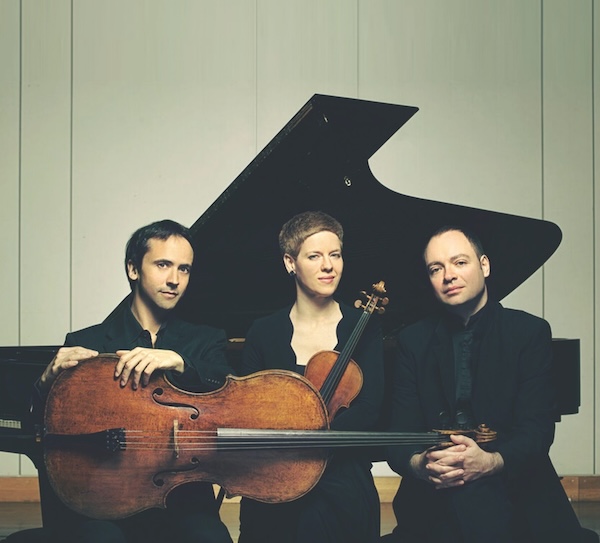Melnikov-Faust-Queyras Trio bring introspective power to Library of Congress

The Melnikov-Faust-Queyras Trio performed Friday night at the Library of Congress.
Pianist Alexander Melnikov, violinist Isabelle Faust, and cellist Jean-Guihen Queyras are all outstanding musicians. Individually, each has performed exquisite solo recitals in Washington within the last decade, all at the Phillips Collection, where their subtle interpretations could be heard close up.
The Library of Congress brought them together for a superlative concert as a piano trio Friday night. The group has been performing and recording together for over a decade, meaning that they are not a trio of superstars who happen to come together once in a while. They re-released their ground-breaking “Schumann Trilogy” as a box set last month. These three discs from the last decade combined the three solo concertos Schumann composed for their instruments, each paired with one of the composer’s piano trios, all performed on historical instruments.
So it was a particular pleasure to hear them perform Schumann’s Piano Trio No. 2 at the opening of this concert. Melnikov played not on a 19th-century piano, as he did on their recordings, but on the Library’s Steinway, where he brought out a transparency of tone informed by the older instrument. Likewise, Faust and Queyras carefully reserved their loudest sounds for major climaxes, preferring to explore the most intimate sides of the score.
The first movement’s stormy tempo created a lively backdrop, beautifully balanced among the three instruments so that no one player ever dominated the texture for long. In the longing development section, Schumann alluded to a song from his Op. 39 Liederkreis, a descending melodic fragment floated over the turmoil seraphically by all three musicians. This contrapuntal interweaving marked all the movements, a signature element of Schumann’s style.
In the second movement, the trio took Schumann’s indication, “with intimate expression” at face value, overlapping their entwined lines in gorgeous patterns with introspective stillness. Even more striking was the slightly off-kilter waltz of the third movement, played at a perfect moderate tempo, with undulating rubato in which the trio advanced or pulled back the tempo with unified spontaneity.
The finale, taken at an adventurous clip, sealed the impression of a performance that sanded off the more curious edges of this piece, especially its often eccentric harmonic style. As a result, this piano trio, which in other hands might come across as quirky and overdone, bristled with an interior sense of agitation that roiled just below the surface.
A similar feeling prevailed in the 21st-century piece that came next, Elliott Carter’s swan song, Epigrams. The American composer completed this set of twelve miniatures for piano trio not long before he died in 2012, when he was 103 years old. Carter explored the sonic extremes of all three instruments, generally in sparse textures replete with interrupting silences, in a score whose principal appeal is its laconic brevity.
The trio responded to this strange piece by maximizing the musical shape of each line, such as it was, taking care with each articulation, each expressive twist, rendering even clashing sounds with as much beauty as possible. Out of discordant disagreements something as simple as a major or minor triad could suddenly appear, and timbral effects, such as one instrument quietly appearing out of the shadow of another in the fifth movement, hovered in the air.
Some movements put individual instruments in the spotlight, as with Queyras’s lyrical cello solo in the sixth movement, oblivious to the violin’s haranguing shrieks. Others focused on types of sound, like the staccato and pizzicato seventh movement or the disembodied string harmonics in the ninth, where Faust and Queyras’s graceful whistle tones were accompanied by Messiaen-like dissonant bird calls in the piano. Melnikov heightened the work’s conclusion, short notes for all three instruments spread far apart, by playing his B-flat with his hand dampening the string inside the piano case, a detail not called for in the score.
The program ended in sheer beauty with a smoldering reading of Brahms’ Piano Trio No. 1, composed when he was only 20 years old and revised decades later. In the first movement, Queyras played the main theme with romantic ardor, joined at the recapitulation by Faust in counterpoint. That Melnikov could play so delicately in the large-handed piano textures, made his powerful surges at climaxes even more overwhelming.
The group gave a fast but soft sheen to the Scherzo, contrasting it with a much slower and deliberate Trio. With the una corda pedal, Melnikov gave a ghostly presence to the descending chords of the slow movement, out of which Queyras and Faust spun longing lines. The Finale balanced a rapid tempo, active and thrilling, with an emphasis on extended melodic shapes rather than individual notes. Melnikov, having held back so much during the piece, took over the texture brilliantly in the middle section, rounding out a stellar performance.
Moving from ardor to tragedy, Melnikov introduced the encore, the slow movement of Schumann’s Piano Trio No. 3, with somber words. Overcoming his reluctance to speak during a concert, saying his last time had been after the Russian invasion of Ukraine in 2022, he referred to a tragedy in his native country. Earlier in the day, news came of the death of Russian political prisoner Alexei Navalny, after three years of state neglect largely while detained in solitary confinement. Schumann’s poignant music had the power to state what words could not.
Le Consort, with Justin Taylor at the harpsichord, performs a concert of baroque music 8 p.m. February 29. loc.gov

Posted Feb 19, 2024 at 11:58 am by Caroline Mousset
A brilliant review of an unforgettable and masterfully performed concert. Thanks, Charles!